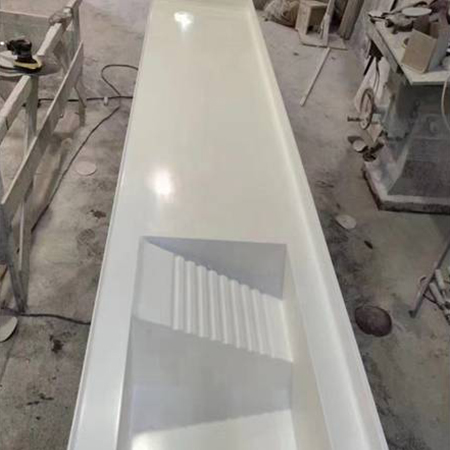
In the dynamic landscape of bathroom design, the choice of countertops and sinks plays a pivotal role in shaping both the aesthetic and functional aspects of the space. This article aims to explore and compare the advantages of Solid Surface Bathroom Countertops with Integrated Sinks against traditional countertops, delving into differences in appearance, maintenance, and durability.

Aesthetic Sophistication
Solid surface bathroom countertops with integrated sinks offer a seamless and modern aesthetic. The absence of visible seams creates a sleek, continuous surface, enhancing the overall contemporary appeal. In contrast, traditional countertops may have noticeable seams, potentially impacting the visual harmony of the bathroom.
Design Versatility
Integrated sinks in Solid Surface Countertops provide designers with greater flexibility in terms of shapes and configurations. This allows for customized designs that cater to individual preferences. Traditional countertops, while diverse in design, may not achieve the same level of integration and fluidity in appearance.
Seamless Integration
One of the standout advantages of Solid Surface Countertops is the integration of sinks directly into the material. This eliminates seams and joints where dirt and bacteria could accumulate, ensuring a cleaner and more hygienic bathroom environment. Traditional countertops, with their separate sinks, may require more attention to cleaning and maintenance in these areas.
Ease of Maintenance
Solid surface countertops are renowned for their low-maintenance characteristics. The non-porous surface is resistant to stains and easy to clean with mild soap and water. Traditional countertops, especially those made of porous materials, may require more meticulous care to prevent staining and maintain their original appearance.
Durability and Resilience
In terms of durability, solid surface bathroom countertops excel. They are resistant to scratches, chips, and impact damage, ensuring a longer lifespan. Traditional countertops, depending on the material, may be more susceptible to wear and tear, especially in high-traffic areas.
Material Options
Solid surface countertops offer a wide range of material options, including engineered stone and acrylic blends. This diversity allows homeowners to choose a material that aligns with their style and performance preferences. Traditional countertops, while also diverse, may not always provide the same level of customization in terms of materials.
Repairability
In the event of damage, solid surface countertops are often repairable. Scratches and minor damages can be sanded out, restoring the surface to its original condition. Traditional countertops, depending on the material, may face greater challenges in terms of repairability.
Cost Considerations
While initial costs may vary, the long-term cost-effectiveness of solid surface countertops can be attributed to their durability and low maintenance requirements. Traditional countertops may have lower upfront costs but could incur higher maintenance and replacement expenses over time.